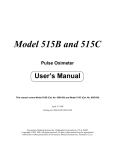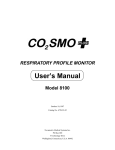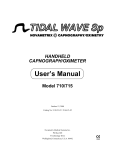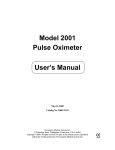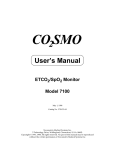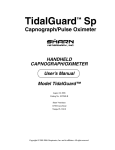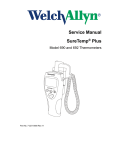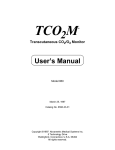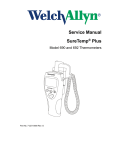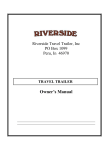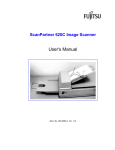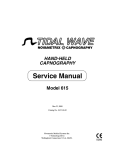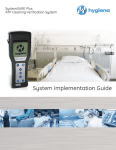Download Model 511 User`s Manual Pulse Oximeter
Transcript
Model 511 User’s Manual Pulse Oximeter May 01, 1996 Catalog No. 6116-23-01/6416-23-01 Copyright 1993, 1996. Novametrix Medical Systems Inc. Wallingford, Connecticut, U.S.A. 06492. All rights reserved. No part of this manual may be reproduced without the written permission of Novametrix Medical Systems Inc. [This page intentionally blank.] ii Model 511 User’s Manual Rev. 01 Manual Revision History Section i Rev. 01 Manual Revision History 21-July-93 Release at revision 00. 01-Mayr-96 Revision 01 (R-N389). Includes Addendums A through D from revision 00. Single patient use sensor information included. MOdel 511 User’s Manual iii Section ii Guarantee Equipment manufactured or distributed by Novametrix Medical Systems Inc., is fully guaranteed, covering materials and workmanship, for a period of one year from the date of shipment, except for certain disposable products and products with stated guarantees other than one year. Novametrix reserves the right to perform guarantee service(s) at its factory, at an authorized repair station, or at the customer’s installation. Contact the Novametrix Technical Service Department, at the numbers listed below, to arrange for warranty repair and to receive a Repair Order Number prior to returning any equipment to Novametrix. Novametrix’ obligations under this guarantee are limited to repairs, or at Novametrix’ option, replacement of any defective parts of our equipment, except fuses, batteries, and calibration gasses, without charge, if said defects occur during normal service. Claims for damages during shipment must be filed promptly with the transportation company. All correspondence concerning the equipment must specify both the model name and number, and the serial number as it appears on the equipment. Improper use, mishandling, tampering with, or operation of the equipment without following specific operating instructions will void this guarantee and release Novametrix from any further guarantee obligations. Service Department For factory repair service, call toll free 1-800-243-3444 In Connecticut, call Collect (203) 265-7701 Facsimile (203) 284-0753 Caution: Federal (U.S.A.) law restricts this device to sale, distribution, or use by or on the order of a licensed medical practitioner. Copyright 1993, 1996, Novametrix Medical Systems Inc. This document contains information which is proprietary and the property of Novametrix Medical Systems Inc., and may not be reproduced, stored in a retrieval system, translated, transcribed, or transmitted, in any form, or by any means, without prior explicit written permission from Novametrix Medical Systems Inc. Model 511 User’s Manual 01-May-96 iv Section ii Guarantee [This page intentionally blank.] v 01-May-96 Model 511 User’s Manual Section ii Contents Manual Revision History ........................................................................................................ iii Guarantee ...................................................................................................................................... iv Contents .......................................................................................................................................... vi Introduction ................................................................................................................................... 1 Principles of Operation .............................................................................................................. 1 Indications and Usage ................................................................................................................ 2 Patient Safety ................................................................................................................................. 3 Warnings .................................................................................................................................... 3 Cautions ..................................................................................................................................... 4 Illustrations .................................................................................................................................... 5 Front Panel Illustration .............................................................................................................. 5 Display Illustrations ................................................................................................................... 6 Monitor Operation ...................................................................................................................... 7 Battery Installation .................................................................................................................... 7 External DC Supply ................................................................................................................... 7 Power On/Off ............................................................................................................................. 8 Display Illumination and Pulse Beep Options ........................................................................... 8 Audible Alarms.......................................................................................................................... 9 Saturation Auto Alert Limits ..................................................................................................... 9 Battery Life .............................................................................................................................. 10 Select and Apply a Sensor to the Patient ................................................................................. 10 Monitoring Saturation and Pulse Rate ..................................................................................... 10 Alerts........................................................................................................................................ 11 Status Messages and Numbers...................................................................................... 11 SpO2 Sensors ............................................................................................................................... 13 Finger Sensor ........................................................................................................................... Finger Sensor Quick Check .......................................................................................... Y-Sensor................................................................................................................................... Y-Sensor Application using Y-Strip Tapes.................................................................... Y-Sensor Application using Ear Clip ............................................................................ Y-Sensor Quick Check .................................................................................................. Single Patient Use SpO2 Sensors............................................................................................. Instructions for Use:...................................................................................................... Model 511 User’s Manual 01-May-96 13 14 15 15 17 18 19 19 vi Section ii Contents Connecting the sensor: .................................................................................................. 19 Sensor Application ........................................................................................................ 21 Single Patient Use SpO2 Sensor Quick Check.............................................................. 22 Serial Communication Option ............................................................................................. 23 Connecting a sensor to the Model 511..................................................................................... Connecting the Model 511 for serial communication ............................................................. NOVACOMM1 Interface ......................................................................................................... Trend Dump .................................................................................................................. Date and Time ............................................................................................................... Setting Date and Time................................................................................................... Clear Trends .................................................................................................................. Exit Command .............................................................................................................. 23 24 25 25 26 27 27 27 Cleaning & Sterilization ......................................................................................................... 29 Model 511 Monitor ....................................................................................................... Finger Sensor ................................................................................................................ Y-Sensor ........................................................................................................................ Y-Strip Tapes................................................................................................................. Ear Clip ......................................................................................................................... 29 29 29 30 30 Specifications ............................................................................................................................... 31 General..................................................................................................................................... Oxygen Saturation (SpO2)....................................................................................................... Pulse Rate ................................................................................................................................ General Specifications ............................................................................................................. vii 01-May-96 31 31 31 31 Model 511 User’s Manual Section 1 Introduction This manual describes the use and operation of the Model 511 Pulse Oximeter, from Novametrix Medical Systems Inc. The Model 511 is a lightweight, easy to use, pulse oximeter that provides reliable measurement and displays for functional pulsatile oxygen saturation (SpO2) and pulse rate. The monitor is powered from four standard AA size alkaline batteries, or may be connected to an optional external power source for continuous mains operation. Numerical SpO2 and Pulse Rate information is presented on a liquid crystal display (LCD). A pulsatile signal activity bar, battery strength indicator, and general alarm indicators are also displayed on the LCD. The Model 511 controls include a power on/off switch that also controls display illumination, and an alarm key that enables/disables audible alarms, and sets alert limits. Model 511 monitors (Cat. No. 6416-00) are available with a serial communications option which allows patient trend information to be downloaded into the Novametrix NovaCARD Data Archive System or other communicating devices. Interfacing between the communicating device and the monitor is via a simple cable connection. See “Serial Communication Option” on page 23 for more information. Principles of Operation The Model 511 measures oxygen saturation and pulse rate with sensors that contain red and infrared light sources, called LEDs. Since oxygen saturated blood absorbs different amounts of light at each wavelength (red and infrared) as compared to unsaturated blood, the amount of light absorbed by the blood in each pulse can be used to calculate oxygen saturation. The light energy from red (660 nm) and infrared (940 nm) LEDs is beamed through a sample cell—a pulsating vascular bed, the patient’s finger or toe for example. The remaining light energy not absorbed by the sample cell reaches a light receptor, called a photodiode, on the opposing side of the sensor. The data received at the photodiode is sent back to the monitor where it is split into its red and infrared components, digitized, processed by a microprocessor chip, and finally displayed as a numerical value for oxygen saturation and a plethysmogram. The Model 511 is calibrated to display “functional” saturation. This differs from the “fractional” saturation value displayed by most co-oximeters. Functional saturation represents the amount of oxyhemoglobin as a percentage of the hemoglobin that can be Model 511 User’s Manual 01-May-96 1 Section 1 Introduction oxygenated. Dysfunctional hemoglobins (COHb and METHb) are not included in the measurement of functional saturation. Calculating Functional Oxygen Saturation Functional Saturation = HbO2 = Fractional Hemoglobin HbO2 COHb = Carboxyhemoglobin 100 - (COHb + METHb) METHb = Methemoglobin Pulse Rate is calculated by measuring the time interval between the peaks of the infrared light waveform. The inverse of this measurement is displayed as pulse rate. The Model 511 must be used in conjunction with OxySnap SuperBright™ saturation sensors. Indications and Usage The Model 511 Pulse Oximeter is intended to be used for monitoring of oxygen saturation and pulse rate. The Model 511 is designed to monitor all patient areas including adult, pediatric and neonatal. 2 01-May-96 Model 511 User’s Manual Section 2 Patient Safety For maximum patient and operator safety, the following are recommended; • Failure of Operation: If the monitor fails to respond as described, do not use it until the situation has been corrected by qualified personnel. • Keep the Model 511 and its accessories clean. • Do not operate the Model 511 when it is wet due to spills or condensation. • Do not operate the Model 511 if it appears to have been dropped or damaged. • Care should be exercised to assure continued peripheral perfusion distal to the SpO2 sensor site after application. Do NOT attach an SpO2 sensor distal to a blood pressure cuff. Valid data CANNOT be processed when the cuff is inflated. Attach the sensor to the limb opposite to the site used for the blood pressure cuff. Warnings Warning Indicates a potentially harmful condition that can lead to personal injury. ! • Explosion Hazard: Do NOT use the Model 511 in the presence of flammable anesthetics. Use of this instrument in such an environment may present an explosion hazard. • Electrical Shock Hazard: Always turn the Model 511 off before cleaning it. Do NOT use a damaged sensor or one with exposed electrical contacts. Do not use with a damaged external power source or one with a damaged cord. Refer servicing to qualified service personnel. • Failure of Operation: If the monitor fails to respond as described, do not use it until the situation has been corrected by qualified personnel. • Patient Safety: Care should be exercised to assure continued peripheral perfusion distal to the SpO2 sensor site after application. • Data Validity: As with all pulse oximeters, inaccurate SpO2 and Pulse Rate values may be caused by; • Incorrect application or use of a sensor • Significant levels of dysfunctional hemoglobin; carboxyhemoglobin or methemoglobin • Significant levels of indocyanine green, methylene blue, or other intravascular dyes (continued next page) Model 511 User’s Manual 01-May-96 3 Section 2 Patient Safety • Exposure to excessive illumination such as surgical lamps—especially ones with a xenon light source, or direct sunlight • Excessive patient movement • Venous pulsations • Electrosurgical interference Cautions Caution Indicates a condition that may lead to equipment damage or malfunction. • Do not operate the Model 511 when it is wet due to spills or condensation. • Do not operate the Model 511 if it appears to have been dropped or damaged. • Never sterilize or immerse the monitor in liquids. • Do not sterilize or immerse sensors except as directed in this manual. • No tension should be applied to any sensor cable. • Do not store the monitor or sensors at temperatures less than 14° F (-10° C) or greater than 131° F (55° C). • Do not operate the monitor or sensors at temperatures less than 32° F (0° C) or greater than 130° F (54.4° C). • Caution: Federal (U.S.A.) law restricts this device to sale, distribution, or use by or on the order of a licensed medical practitioner. 4 01-May-96 Model 511 User’s Manual Section 3 Illustrations Front Panel Illustration Front Panel Illustration SpO2 beats/min SATURATION PULSE RATE % Saturation and Pulse Rate display identifiers Display, see next section 511 Pulse Oximeter Audible Alert Enable/disable Key Power On/Off control DC Input Jack Model 511 User’s Manual 01-May-96 5 Section 3 Illustrations Display Illustrations Typical display % Saturation display (0-100) Pulse Rate display (30-250) Pulse Activity Bar (16 bars) Audible Alert Disabled Icon Battery Indicator (3 levels) Full Half Low Typical alert condition display % Displays “blanked” (dashes) Message displayed as needed SENSOR OFF PATIENT All displays illuminated Status number displayed as needed % UNIT/SENSOR ERROR REPOSITION SENSOR SENSOR OFF PATIENT SENSOR DISCONNECT 6 01-May-96 Model 511 User’s Manual Section 4 Monitor Operation Battery Installation The Model 511 operates on four (4) 1.5 volt “AA” alkaline batteries. Other battery types should not be used with the Model 511. WARNING: Use of improper batteries may present a risk of fire or explosion. Top of monitor To install batteries into the monitor: 1. Locate the battery compartment cover on the back side of the monitor. 2. Press the “OPEN” area of the compartment cover, slide the cover in the direction indicated by the arrow, and remove the cover. 3. Install new batteries according to the “+” and “-” symbols on the bottom of the battery compartment and on each battery. WARNING: Alkaline batteries may explode or leak if recharged, inserted improperly or disposed of in a fire. Do not open batteries. 4. Slide the battery cover back into place. The cover latches into place when properly seated. Bottom of monitor External DC Supply The Model 511 can be powered by an external DC supply. The supply plugs into the small DC power jack located on the lower right side of the monitor. The external supply draws its power from the mains. Both 105-130 VAC and 230 VAC (50/60Hz) versions are available. When the external power supply is used, the batteries are disconnected from the monitor internally, however the battery icon displays a fully charged condition. While powered from the external supply the battery icon does not reflect the condition of the batteries. When changing operation from the external supply to battery (external supply disconnected) allow the monitor to run for one minute, after which the icon will reflect the true battery charge. WARNING: Use only Novametrix supplied external power supplies. The use of other external power sources may jeopardize patient safety, or may damage the Model 511. Model 511 User’s Manual 01-May-96 7 Section 4 Monitor Operation Power On/Off 1. To turn the monitor on, press and hold the power control. A tone sounds to verify audio is functional, the monitor performs a system self-test, all display segments are briefly illuminated, the software version is displayed, the number “1” will be displayed in the alert triangle, it will then sequence through to “4”. Release the power control key when the desired number is displayed (illumination/pulse beep options). Reference the next section “Display Illumination and Pulse Beep” for an explanation on the options available. If the power control key is pressed, but not held the monitor will power up as described above and will default to selection of “1” for the illumination/pulse beep options (both OFF). SpO2 and pulse rate information will be displayed within 20 seconds of power up, provided the sensor is properly applied to the patient prior to power up or prior to the completion of any monitor self test. 2. To turn the monitor off, press the power control. Display Illumination and Pulse Beep Options The Model 511 is supplied with a display illumination option, this is designed for better viewability under low ambient lighting conditions. A pulse beep option is also available, this will emit a tone with each pulse detected by the monitor. These options are selected or deselected at power up by holding the power control key until the desired option combination number is displayed, then releasing the power control key to select that number. There are four possible options in regards to display illumination and pulse beep when powering on the Model 511. The four options will appear in sequence in the status field as numbers one through four, these are identified below: Option Number Illumination Pulse Beep 1 Illumination OFF Pulse Beep OFF 2 Illumination OFF Pulse Beep ON 3 Illumination ON Pulse Beep OFF 4 Illumination ON Pulse Beep ON 1. To select one of the four display illumination/pulse beep options press and hold the power control key when the monitor is off. The monitor will power up as described in “Power On/Off” on page 8. The status number field will display “1” inside the alert triangle, it will then change to “2” and sequence through to “4”. If the power control key is still held after the “4” is displayed the monitor will shut off. 2. To select the desired option release the power control key when the appropriate number is displayed inside the alert triangle. 3. To select another option, press the power control to turn the monitor off. Press and hold the power control to turn the monitor back on and select another option number. 8 01-May-96 Model 511 User’s Manual Audible Alarms Audible Alarms 1. To toggle between enabled and disabled audible alarms, press and release the alarm key. If pressing and releasing the alarm key causes the alarms to be enabled, the monitor shall display the saturation auto alert limit settings (in the SpO2 and pulse rate displays) for three seconds, beep once, and turn off the alarm icon. The alarm display icon will not be displayed while audible alarms are enabled. All visible alerts continuously active for longer than 10 seconds will cause an unlatched audible alarm to sound. Display showing alert limits when audible alert is enabled % Alert limits shown for 3 seconds (default values shown here) NOTE: Disabling and re-enabling the audible alarms will reset the ten second delay clock when an alert condition exists. If pressing and releasing the alarm key causes the alarms to be disabled, the monitor shall beep once, and turn on the alarm icon. The alarm display icon will illuminate as a warning that the audible alarms are disabled. Typical display with audible alert icon displayed % Audible alert icon shown when audible alert is disabled NOTE: With the audible alarms disabled, the audible alarm will not sound under any alert condition. Saturation Auto Alert Limits 1. To set alert limits, press and hold the alert key for more than 2.5 seconds. The monitor will beep twice if new limits are set (based on valid SpO2 values). If no SpO2 is displayed, the monitor will use default limits and will beep three times. The Model 511 will display the high limit in the SpO2 display and the low limit in the pulse rate display for three seconds. The monitor will then return to normal operation. NOTE: Setting alert limits automatically enables the audible alarms. Model 511 User’s Manual 01-May-96 9 Section 4 Monitor Operation 2. To display limits without setting new limits if audio is enabled, press and release the alarm key twice. The first press turns off the alarms and the second turns them back on and causes the high and low limits to be displayed for three seconds. The monitor will then return to normal operation. 3. To display limits without setting new limits if the audio is disabled (audible alert icon visible), press and release the alarm key. The high and low limits will be displayed for three seconds before the monitor returns to normal operation. Press and release the alarm key to disable the audible alarms. Battery Life The Model 511 displays a battery icon to indicate: • fully charged batteries, over 4 hours of battery life • less than 4 hours of battery life • indicates less than 2 hours of battery life • (flashing) less than 15 minutes of battery life When the battery voltage reaches the 2 hour level , the battery is very low. As the battery reaches near depletion, the battery icon will flash at a rate of once per second, and the alert audio will sound, this alert tone cannot be muted (even if alerts are disabled). Continued use of the monitor at this point will result in the monitor shutting itself off. NOTE: The above information is based upon normal monitoring conditions (e.g. sensor on patient, new alkaline batteries). Use of non-alkaline, previously used alkaline, or rechargeable alkaline batteries will affect the battery life times. Prolonged use of the backlight can significantly reduce overall battery life. The battery icon may appear fully charged for the first minute after power up, after which it will reflect the true battery charge. NOTE: When operating from the external power supply the battery icon does not reflect the condition of the batteries. See “External DC Supply”. Select and Apply a Sensor to the Patient Refer to Section 5. Monitoring Saturation and Pulse Rate Once the Model 511 is powered on and a sensor is connected to the monitor and properly applied to the patient, numerical SpO2 and Pulse Rate values appear on the monitor’s display. A “pulse activity bar”, derived from the pulsatile signal, is also displayed. The monitor automatically adjusts the activity bar’s length to produce an easily visible display. Verify the pulse activity bar reflects the patient’s pulse. The bar should show regular rhythmic movement. Erratic or non-rhythmic pulse bar activity may indicate a poorly positioned or applied sensor, or may be indicative of excess patient movement at the sensor site. Check the sensor site and if necessary, attempt to reduce patient movement. Violation of the upper or lower saturation auto alert limits shall immediately cause a “H” or “L” to flash within the borders of the display alarm icon, even if the icon itself is disabled. 10 01-May-96 Model 511 User’s Manual Alerts If the Model 511 cannot detect “valid” saturation data with which to update the display, the previous contents of the display shall be “held”. Should the display be held for more than ten seconds, a “-” character will start to flash within the borders of the display alarm icon, even if the alarm icon itself is disabled. If the Model 511 cannot detect valid pulsatile data from the sensor within sixty seconds, the saturation and pulse rate displays will blank out (display “--” and “---” respectively). If the display is held longer than ninety seconds the Model 511 will emit an audible unlatched alarm (if enabled) and REPOSITION SENSOR along with the number 9 will appear in the display. If at any time the monitor processes valid data with which to update the display, the “-” will stop flashing, the display will be updated, the timer reset to zero (seconds), and the audible alarm, if active, will be reset. Alerts Status Messages and Numbers The Model 511 will display status messages and related status numbers under certain conditions: % Typical status message and number display Message displayed as needed SENSOR OFF PATIENT Status number The following table lists the conditions that cause status messages to be displayed. Summary of status messages and numbers. Model 511 User’s Manual Message Number Condition Sensor Disconnect Sensor Off Patient Reposition Sensor 1 2 3 Reposition Sensor 4 Reposition Sensor Reposition Sensor 5 6 Unit/Sensor Error 7 Unit/Sensor Error 8 Reposition Sensor 9 01-May-96 Sensor not connected to monitor. Sensor not applied to the patient. Low signal strength. Pulse strength as detected by the sensor is too small for proper monitor operation. Insufficient light. Sensor placed on a site too thick (or opaque) for adequate light transmission. Pulse out of range. Pulse must be 30-250 bpm inclusive. Light Interference. Ambient light sources (sunlight, warming lights, etc.) are interfering with sensor operation. Shield sensor from these light sources. Sensor fault. Remove sensor from use and contact qualified service personnel. Monitor fault. Record the error number that appears in the pulse rate display. Remove the monitor from use and contact qualified service personnel. Bad signal, monitor not receiving valid signals from sensor. May be caused by excessive motion, cardiac arrhythmia or other situations leading to poor signal. Check patient status, reposition sensor. 11 Section 4 Monitor Operation All status conditions except for Unit/Sensor Error will reset automatically once the condition is corrected. Unit/Sensor Error conditions are latching conditions—that is you must replace the sensor for a sensor fault, or turn the Model 511 off and fix the problem before the monitor fault is reset. 12 01-May-96 Model 511 User’s Manual Section 5 SpO2 Sensors The Model 511 Pulse Oximeter requires OxySnap SuperBright SpO2 Sensors. WARNING: Connect only Novametrix OxySnap SuperBright saturation sensors to the Model 511. DO NOT use other sensors or accessories with the Model 511. Before connecting to the patient or to the Model 511, ensure sensors are physically intact, with no broken, frayed or damaged components. Ensure the connectors are clean and dry, with no signs of contamination or corrosion. Do not use a broken or damaged sensor or one with wet, contaminated or corroded connectors. To attach an OxySnap SuperBright sensor to the Model 511: 1. Align the arrows on the OxySnap connectors and press the connectors together. OxySnap Connector Sensor Model 511 2. To disconnect, grasp the connectors at the finger grips and pull them apart. Finger Sensor The Finger Sensor is intended for adult fingers and not designed for neonatal or pediatric applications. OxySnap Finger Sensor Before applying the sensor to the patient, verify the sensor is physically intact, with no broken/frayed wires or damaged parts. Ensure the connectors are clean and dry, with no signs of contamination or corrosion. Do not use a broken or damaged sensor or one with wet, contaminated or corroded connectors. Model 511 User’s Manual 01-May-96 13 Section 5 SpO2 Sensors To apply the finger sensor to the patient; 1. Gently squeeze the grips at the rear of the sensor (indicated by arrows below). Applying the Finger Sensor to the Patient Placement Guide Cable exits above finger 2. Position fingertip against placement guide with fingernail towards the red light. Do not position the finger so as to protrude past the placement guide. 3. Release the finger grips. 4. Inspect the site often for adequate circulation—at least once every four hours. 5. To remove sensor, gently squeeze grips and slide the sensor from the finger. CAUTION: Overstretching the pulse oximeter finger sensor can damage the sensor and potentially affest pulse oximeter readings. Do not stretch the finger sensor open beyond the limit for which it was designed. Overstretching can be preventerd: avoid opening the sensor by any means other than squeezing the grips; DO NOT force the sensor onto large objects such as bedrails. Finger Sensor Quick Check 1. Is Probe Off Patient illuminated when the sensor is connected to the monitor but not applied to the patient? 2. Apply the sensor to your index finger. Are reasonable SpO2 and pulse rate values displayed? 3. A YES to BOTH #1 and #2 indicates the sensor is OK. Apply the sensor to the patient as instructed above. The quick check also tests the functionality of the extension cable. 14 01-May-96 Model 511 User’s Manual Y-Sensor Y-Sensor The reusable Y-Sensor is a flexible versatile sensor designed for use on any patient. OxySnap Y-Sensor Before applying the sensor to the patient, verify the sensor is physically intact, with no broken/frayed wires or damaged parts. Ensure the connectors are clean and dry, with no signs of contamination or corrosion. Do not use a broken or damaged sensor or one with wet, contaminated, or corroded connectors. The Y-Sensor’s Center Strip is not a functional part of the sensor. Its purpose is to aid in the placement of the sensor into the tape or other securing system. The center strip may be removed (carefully cut away) if the distance between the sensor heads needs to be changed from 25 mm. Y-Sensor showing Center Strip removed Sensor Heads Center Strip Strip may be removed Y-Sensor Application using Y-Strip Tapes 1. Select a Y-Strip based on the patient type and intended sensor location. Y-Strips come in two color coded sizes: 25 mm tapes are coded green, and 20 mm tapes are coded blue. The size refers to the distance between the holes in the tape. Y-Strip Application Sites and Catalog Numbers Model 511 User’s Manual Wrap Style Tape Cat. No. 8829 25 mm (Green) Neonatal Foot, Hand Cat. No. 8836 Cat. No. 8828 Non-adhesive Foam 20 mm (Blue) Wrap Neonatal Foot, Hand Pediatric Toe, Finger 01-May-96 15 Section 5 SpO2 Sensors Finger Style Tape Cat. No. 8832 25 mm (Green) Adult Finger Cat. No. 8831 20 mm (Blue) Pediatric Finger Adult Finger 2. Remove the portion of the release liner containing the holes. Remove release liner with holes. Cat. No. 8828/8829 Cat. No. 8831/8832 3. Skip this step if using the 25 mm Y-Strip tape. If using the 20 mm Y-Strip tape, carefully remove the sensor’s center strip using a pair of scissors or a sharp blade. The center strip does not effect sensor operation, its purpose is to aid putting the sensor into the 25 mm tape. 4. Press the “button”, on the back of each sensor head, through a hole in the tape. Press in from the sticky side of the tape. The tape will stretch to fit the sensor button. Y-Sensor placed on Y-Strip tape. Liner this side (top) Head Y-Strip Tape Cross Section Button 5. Remove the remaining release liner and apply the sensor/tape to the patient. Do not wrap the tape around the limb so tightly that circulation is restricted. Inspect the site often for adequate circulation—at least once every four hours. Ensure that the sensor heads are directly opposite each other through the tissue. This prevents the sensor from being placed on a site too thick (high arch) for proper operation. Position the sensor so that the tape does not extend over the space between the fingers or toes to insure there will be no light transmission through this space. 6. To maximize sensor life, secure the sensor to the patient with additional tape. 16 01-May-96 Model 511 User’s Manual Y-Sensor Leave slack in the wires between the tape and the sensor. Y-Sensor applied to patient Adult/Pediatric Finger Neonatal/Pediatric Foot Neonatal Hand Pediatric Toe 7. Inspect the site often for adequate circulation—at least once every four hours. Y-Sensor Application using Ear Clip 1. Remove center strip from the Y-Sensor. Y-Sensor before attachment to Ear Clip SENSOR HEADS CENTER STRIP (REMOVE) 2. Slide each Y-Sensor head into the ear clip‘s receptacles, the heads should face each other. Y-Sensor placed on Ear Clip SENSOR HEAD EAR CLIP RECEPTACLE SQUEEZE HERE TO APPLY 3. Gently squeeze the end of the ear clip (shown in diagram), and apply the sensor to the patient. Model 511 User’s Manual 01-May-96 17 Section 5 SpO2 Sensors If a satisfactory reading cannot be obtained, rub the site and/or use adhesive dots for better response. The adhesive dots (PN: 8700-00) included with the ear clips will also help in preventing the ear clip from falling off (e.g. during exercising). Y-Sensor with Ear Clip placed on patient ear ADULT EAR OPTIONAL PLACEMENTS WARNING: Inspect the site often for adequate circulation—at least once every four hours. When applying sensors take note of patient’s physiological condition. For example, burn patients may exhibit more sensitivity to heat and pressure and therefore additional consideration such as more frequent site checks may be appropriate. Y-Sensor Quick Check 1. With the Y-Sensor connected to monitor but not applied to patient, position the sensor heads so that they face each other (the red light shines at the detector). Is Probe Off Patient illuminated? 2. Tape the Y-Sensor to your index finger. Does the monitor shows reasonable SpO2 and pulse rate values? 3. A YES to BOTH #1 and #2 indicates the sensor is OK. Apply the sensor to the patient as instructed above. The quick check also tests the functionality of the extension cable. 18 01-May-96 Model 511 User’s Manual Single Patient Use SpO2 Sensors Single Patient Use SpO2 Sensors Intended Use: The Single Patient Use SpO2 sensors (Catalog Nos. 6480 and 6455) can be used when monitoring adult, pediatric or neonatal patients with Novametrix Pulse Oximeters (SuperBright™ series). These sensors are used with the DB-9 connector cable. WARNING: Use the Single Patient Use sensor and DB-9 connector cable only with Novametrix SuperBright compatible pulse oximeters. Use with any other device may result in equipment damage or patient injury. CAUTION: These SpO2 sensors are intended for single patient use. The sensors can be reapplied to various sites on the same patient but should not be used on multiple patients. Do not attempt to clean or disinfect the sensor, as system performance will be compromised. NOTE: The Single Patient Use sensor should be discarded if sensor integrity becomes a question. Instructions for Use: Connecting the sensor: 1. Attach the DB-9 to OxySnap connector cable to the Model 511. Align the arrows on the OxySnap connectors and press the connectors together. Model 511 Model 511 DB-9 Connector Cable Model 511 User’s Manual 01-May-96 19 Section 5 SpO2 Sensors Model 511 with RS232 Model 511 with RS232 option 6292-01 cable DB-9 to OxySnap Connector 2. Press the black connector on the end of the DB-9 to OxySnap extension cable into the black connector on the end of the Single Patient Use SpO2 sensor. DB-9 connection DB-9 to OxySnap connector sensor connector 20 01-May-96 Model 511 User’s Manual Single Patient Use SpO2 Sensors 3. To disconnect the DB-9 to OxySnap connector cable, grasp the connectors and pull them apart (the DB-9 to OxySnap connector can remain attached to the Model 511 as long as single patient use sensors will be used). Sensor Application 1. Select the appropriate size sensor based on the patient type. PEDIATRIC/ADULT SENSOR ADULT TOE ADULT FINGER NEONATAL/PEDIATRIC SENSOR NEONATAL HAND NEONATAL FOOT PEDIATRIC TOE 2. Apply the sensor by placing the blue side of the sensor wrap against the skin, wrap it around the site (cut excess foam if necessary) and secure with Velcro® tab. The Velcro tab on the neonatal/pediatric version is removable to allow the foam wrap to be cut before applying to the patient. VELCRO TAB CUT EXCESS OFF NEONATAL/PEDIATRIC SENSOR Ensure that sensor heads are positioned directly opposite each other through the tissue. The adhesive dots (Cat No 8700) which are included with each sensor can be applied the sensor before patient application for additional adhesion to the site. Model 511 User’s Manual 01-May-96 21 Section 5 SpO2 Sensors 3. For additional support, secure the cable along the limb with tape. WARNING: Do not wrap the sensor around the limb so tightly that circulation is restricted. Inspect the site often, at least every four hours, for adequate circulation. When applying sensors, take note of patients physiological condition. For example, burn patients may exhibit more sensitivity to heat and pressure and therefore additional consideration such as more frequent site checks may be appropriate Single Patient Use SpO2 Sensor Quick Check 1. With the sensor connected to the monitor but not applied to the patient, position the sensor heads so that they face each other (the red light shines at the detector). Is PROBE OFF PATIENT displayed? 2. Apply the sensor to your index finger. Are reasonable SpO2 and pulse rate values displayed? 3. A YES to BOTH #1 and #2 indicates the sensor is OK. Apply the sensor to the patient as instructed above. This quick check also tests the functionality of the DB-9 to OxySnap connector cable. 22 01-May-96 Model 511 User’s Manual Section 4 Serial Communication Option Model 511 monitors (Cat. No. 6416-00) are available with a serial communications option which allows patient trend information to be downloaded into the Novametrix NovaCARD Data Archive System or other communicating devices. A 15-pin mini-D connector (PATIENT/SERIAL INTERFACE) on the top panel indicates the option is installed. An interface cable (Novametrix Cat. No. 6493-01) is required for connection between the monitor and the communicating device. The PATIENT/SERIAL INTERFACE connector is shared between patient monitoring and serial communication. When attaching a sensor for patient monitoring, the 6292-01 cable must be connected to the PATIENT/SERIAL INTERFACE, the sensor will plug into the other end of the cable. When utilizing the monitor for serial communication the 6293-01 interface cable must be used, this cable terminates in a 9 pin D female for connection to the communication device. Connecting a sensor to the Model 511 1. Plug the 6292-01 cable into the PATIENT/SERIAL INTERFACE connector. Connecting a sensor to the Model 511 Model 511 6292-01 cable OxySnap connection for SuperBright™ sensor 2. Connect an OxySnap Finger or “Y” sensor into the end of the cable. 3. Apply the sensor as described in “Y-Sensor” on page 15. Model 511 User’s Manual 01-May-96 23 Section 4 Serial Communication Option Connecting the Model 511 for serial communication 1. Unplug any sensor that may be connected from the connector. PATIENT/SERIAL INTERFACE 2. Connect the 6293-01 interface cable to the PATIENT/SERIAL INTERFACE connector on the monitor, plug the other end into the communication device. Connecting the Model 511 for serial communication Model 511 6293-01 cable Connection to computer or communication device 3. If using the NovaCARD Data Archive System, please refer to the NovaCARD User’s Manual (Cat. No. 6066-23) for set-up and operation of the NovaCOMM interface. (See “NovaCOMM Setup (Direct Cable)”, page 13 under the “Hardware Setup” section). 4. If you are using a communications package other than NovaCARD send the appropriate commands from the device to the monitor as instructed in the next section titled “NOVACOMM1 Interface”. 24 01-May-96 Model 511 User’s Manual NOVACOMM1 Interface NOVACOMM1 Interface The NOVACOMM1 interface is designed to output data in formats easily read by a computer or data logging device. The computer interface provides the user the ability to “dump” trend information to a computer file for later analysis. The communication format is 9600 baud, 8 bits, no parity, 1 stop bit and XON/XOFF handshaking. Trend Dump Trend data is transmitted as a succession of records. The record size for Model 511 is 16 bytes of ASCII Hexadecimal data. A record can be one of two types, an INFO record or a DATA record. The INFO record contains monitor information such as time of day, date, limit settings, and units. The DATA record contains event marker, audio disable, SpO2, and pulse rate values. The first record sent is always an INFO record. This record reflects the oldest data in the buffer, then records would continue being sent in chronological order from the oldest record to the newest record. In normal monitoring use, an INFO record would be followed by 15 data records, followed by another INFO record and then another 15 data records, etc. Turning the monitor off, or changing the limits will disrupt this sequence. When this occurs a new INFO record will be sent and indicate the time and date, along with the current limits. At this point, unless another exception occurs, the next INFO record will be followed by 15 DATA records. An INFO record can be distinguished from a DATA record by the first byte. The first byte of an INFO record is FF, the first byte of a DATA record is 00-C8 (0-200 decimal), or FB (pen lift or no data available). Any other values are not applicable. The DATA record uses 8 data points per parameter, at 8 second resolution, for a total of 64 seconds of trend data per data record. To request trend dump, the computer must send an ASCII “6” character. The monitor echoes back the “6” character and transmits the first INFO record. The Mode 6 data format is; INFO record; byte 0 T********************************<cr><lf> byte 15 where; T- Trend mode identifier **-INFO byte, starting at byte 0 and ending at byte 15 (see below) INFO record byte assignment byte -0 byte-1 byte-2 byte-3 byte-4 byte-5 byte-6 byte-7 Model 511 User’s Manual flag byte = FF for INFO record information type (FE-power on, FD-limit change, FC-time stamp) model code = 2 compression ratio = 8 (i.e. 1 point/8 seconds) seconds (0-59) minute (0-59) hour (0-23) day (1-31) 01-May-96 25 Section 4 Serial Communication Option byte-8 byte-9 byte-10 byte-11 byte-12 byte-13 byte-14 byte-15 month (1-12) year (0-99) unused unused unused unused unused unused <cr> - carriage return <lf> - line feed DATA record; byte 0 T**************** ****************<cr><lf> byte 15 T - Trend mode identifier **-DATA byte, starting at byte 0 and ending at byte 39 (see below) DATA record byte assignments byte 0-7 byte 8-15 8 byte SpO2 data, range: 01-28 Hex (1-40 decimal) (corresponds to 60-100%, i.e. a value of 1E Hex that corresponds to 30 decimal will indicate an SpO2 value of 90%), 00-no data available. The MSB and second MSB (bits 7 & 6) of the SpO2 bytes are not used in this monitor and should be masked out. 8 byte pulse rate data, range: 00-FA Hex (0-250 decimal), FB Hex (251 decimal) - no data available over period. <cr> - carriage return <lf> - line feed Date and Time Date and Time mode causes the Model 511 to transmit, on request, the date and time as calculated by the monitor’s internal calendar clock. To request the date and time, the computer must send an ASCII “d” character. The monitor echoes back the “d” character and sends the date and time on the same line. The Mode d data format is; d•MMM/DD/YY•hh:mm:ss<cr><lf> where; d - the echoed command character • - is an ASCII space character MMM - a 3-character month (Jan, Dec), DD - a 2-digit ASCII day (01, 31), YY - the last 2-digits of the year (1990 is 90), hh - a 2-digit hour based on a 24 hour clock (00, 23), 26 01-May-96 Model 511 User’s Manual NOVACOMM1 Interface mm - a 2-digit minute, ss - a 2-digit second, <cr><lf> is a carriage return, line-feed sequence. Setting Date and Time To set the date and time the computer must send the ASCII “s” character. The “s” is the command to set the time. The mode of the data format is; sMM/DD/YY•hh:mm:ss where; • - is an ASCII space character s - the echoed command character MM - a 2-digit month number (01, 12), DD - a 2-digit ASCII day (01, 31), YY - the last 2-digits of the year (1990 is 90), hh - a 2-digit hour based on a 24 hour clock (00, 23), mm - a 2-digit minute, ss - a 2-digit second. There must be a delay of at least 20 msec between bytes so the data receive buffer will not overflow. When the monitor has received the complete command it will echo the date in the format described in the section above. Clear Trends Clear Trends mode allows the user to remotely clear the Model 511 trend memory This action has the same result as the monitor’s Clear Trend function in that trend memory and the Trend Page displays are cleared. Use this remote Clear Trends function with care as there is no way to undo the clear command once issued. To clear the Model 511 trend memory, the computer must send an ASCII “c” character. The Model 511 will echo the “c” followed by a <cr><lf> and then the trend memory will be cleared. Exit Command To exit the NOVACOMM1 mode, the computer must send an “x” or “X” character. The Model 511 will echo the “x” and then stop communication. Sending a new valid command character will start communication again. Model 511 User’s Manual 01-May-96 27 Section 4 Serial Communication Option [This page intentionally blank.] 28 01-May-96 Model 511 User’s Manual Section 6 Cleaning & Sterilization Follow the cleaning and sterilization instructions listed below to clean and/or sterilize the Model 511 and its accessories. Model 511 Monitor • Turn the monitor off before cleaning. • Clean the monitor surface with a cloth dampened with an isopropyl alcohol 70% solution or bleach 10% solution or with the cold liquid sterilants Cidex™, or Sporicidin™, then wipe down with a clean water dampened cloth and dry before use. • Do not immerse the monitor. • Do not attempt to sterilize the monitor. Finger Sensor • Clean the Finger Sensor surface with a cloth dampened with an isopropyl alcohol 70% solution or bleach 10% solution or with the cold liquid sterilants Cidex™, or Sporicidin™. After cleaning wipe the sensor down thoroughly with a clean water dampened cloth to rinse. • Ensure the Finger Sensor windows are clean and dry before reuse. • Do not immerse the Finger Sensor. • Do not attempt to sterilize the Finger Sensor. • After cleaning the Finger Sensor, verify the sensor is physically intact, with no broken/ frayed wires or damaged parts. Ensure the connectors are clean and dry, with no signs of contamination or corrosion. Do not use a broken or damaged sensor or one with wet, contaminated or corroded connectors. • Perform a Finger Sensor Quick Check test before returning the sensor to patient use. Refer to “Finger Sensor Quick Check” on page 14. Y-Sensor • The Y-Sensor may be immersed—up to, but not including, the connector, in a glutheralhyde solution, 10% bleach solution or Sporicidin™. Refer to manufacturer’s instructions and standard hospital protocols to determine recommended times for disinfection/sterilization. • Rinse thoroughly with water and dry before use. • Do not attempt to sterilize Y-Sensor except as stated above. • Do not immerse the connector on the Y-Sensor. Model 511 User’s Manual 01-May-96 29 Section 6 Cleaning & Sterilization • After cleaning/sterilizing the Y-Sensor, verify the sensor is physically intact, with no broken/frayed wires or damaged parts. Ensure the connectors are clean and dry, with no signs of contamination or corrosion. Do not use a broken or damaged sensor or one with wet, contaminated, or corroded connectors. • Perform a Y-Sensor Quick Check test before returning the sensor to patient use. Refer to “Y-Sensor Quick Check” on page 18. Y-Strip Tapes • Treat Y-Strip Tapes in accordance with hospital protocol for single-patient use. Ear Clip • Clean the ear clip with a cloth dampened with 70% isoprophyl alcohol. After cleaning wipe the ear clip down thoroughly with a clean water dampened cloth to rinse. • Do not immerse the ear clip. 30 01-May-96 Model 511 User’s Manual Section 7 Specifications General Specifications for the Novametrix Model 511 Pulse Oximeter, are listed for informational purposes only, and are subject to change without notice. Oxygen Saturation (SpO2) • Range, 0-100% • Accuracy, 80-100% ± 2%, 0-79% unspecified (Approximately 68% of the observations are within the accuracy claim.) • Display Resolution, 1% • Averaging Time, fixed at 8 seconds • Settling Time Display settles to within 1% of the final reading less than 15 seconds after the sensor is properly applied. Pulse Rate • Range, 30-250 beats per minute (bpm) • Accuracy, ± 1% of full scale (Approximately 68% of the observations are within the accuracy claim.) • Display Resolution, 1 bpm • Averaging Time, fixed at 8 seconds • Settling Time Display settles to within 1% of the final reading less than 15 seconds after the sensor is properly applied. General Specifications • Operating Environment 50-104° F (10-40 °C), 0-90% relative humidity (non-condensing) • Weight, 13 ounces including batteries • Dimensions Height 6.25 inches, Width 3.75 inches , Depth 1.3 inches Model 511 User’s Manual 01-May-96 31 Section 7 Specifications • Battery Type, four “AA” alkaline cells. Life, 12 hours. • External power supply Input: 105-130 VAC, 50/60Hz* or 230 VAC, 50/60Hz** Output: 6VDC @ 150ma Cord length: 6 ft. *105-130 volt unit designed to meet electrical tests of U. L. 544 Patient Care Equipment-Patient Connected/Isolated **230 volt unit designed to IEC601 Electrical Specification 32 01-May-96 Model 511 User’s Manual









































